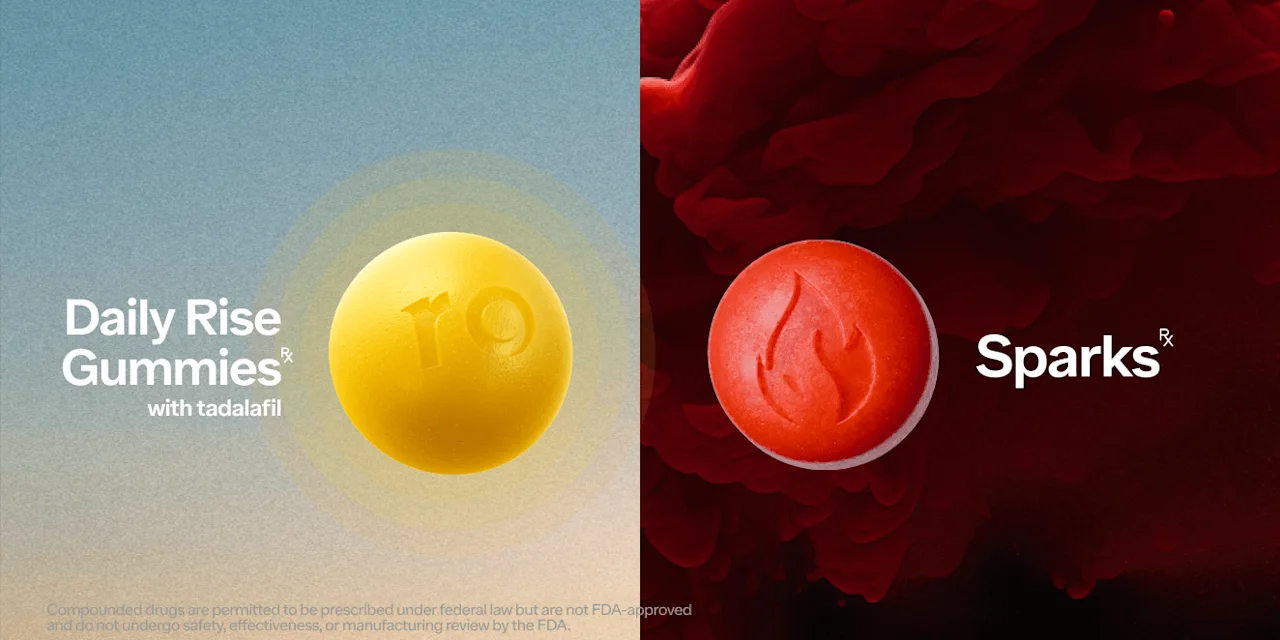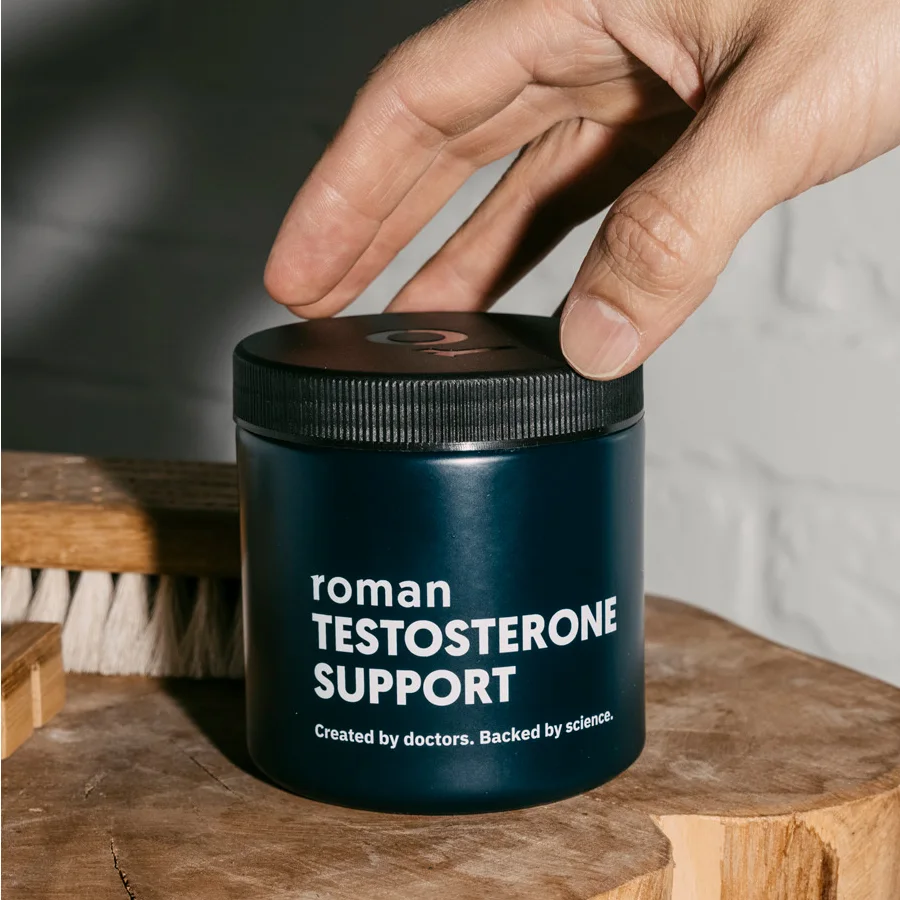Key takeaways
Decreased testosterone levels are a natural part of the aging process but can cause unwanted symptoms in some people. Testosterone replacement therapy may be recommended for men diagnosed with low testosterone levels significantly below normal.
Testosterone boosters are over-the-counter supplements advertised to build muscle, boost energy, and enhance sexual performance. However, most of these claims are not backed by scientific research.
If you’re looking for a non-medical route to address erectile issues caused by low T, the best natural testosterone booster for erectile dysfunction is making certain lifestyle changes. Weightlifting, eating a protein-rich diet, and reducing stress are natural strategies that may improve testosterone levels and benefit overall health.
Here's what we'll cover
Key takeaways
Decreased testosterone levels are a natural part of the aging process but can cause unwanted symptoms in some people. Testosterone replacement therapy may be recommended for men diagnosed with low testosterone levels significantly below normal.
Testosterone boosters are over-the-counter supplements advertised to build muscle, boost energy, and enhance sexual performance. However, most of these claims are not backed by scientific research.
If you’re looking for a non-medical route to address erectile issues caused by low T, the best natural testosterone booster for erectile dysfunction is making certain lifestyle changes. Weightlifting, eating a protein-rich diet, and reducing stress are natural strategies that may improve testosterone levels and benefit overall health.
Many factors can impact sexual function—and that includes testosterone. Though testosterone levels in men naturally decrease with age, for some, this may lead to unwanted changes in the bedroom. If you think you may be experiencing testosterone-related dysfunction, you may be wondering if taking testosterone supplements can help counter this process.
So, what are the best testosterone boosters for erectile dysfunction (ED)? Do “T-boosters” actually work? And more importantly, are they safe? Though there isn’t enough science yet to say if testosterone supplements work as advertised, there are other strategies (as well as FDA-approved treatments) you can try that can help optimize your hormone levels.
Does testosterone help with erectile dysfunction—and how?
Testosterone is a sex hormone that plays an important role in many bodily functions, including libido (sex drive), sperm production, and sexual function. It varies from person to person, but generally for men testosterone levels peak around age 21 and start declining in their 30s.
Testosterone levels are usually classified as “low” when they drop below 300 ng/dL. If you’re experiencing symptoms of low T—like fatigue, low sex drive, hair loss, or erectile dysfunction—see a healthcare provider who can test your hormone levels.
Having low T doesn’t always mean you’ll experience ED, but it can impact the ability to get or maintain an erection for some people. Keep in mind that age isn’t the only thing that can lower T; other factors including hormonal issues, certain medications, and conditions like diabetes and obesity can contribute.
Testosterone can affect sexual function in a few key ways:
Libido (aka sex drive): Testosterone can play a critical role in regulating sex drive. Low levels may reduce libido, which may indirectly contribute to difficulties with arousal and erection.
Mood disturbance: Low testosterone can also affect your mood, which as we know, plays a role in your sexual health.
Insomnia: By impacting sleep, low testosterone can affect your overall energy levels and make you less interested in sex.
Nitric oxide: While testosterone is not directly responsible for achieving an erection, it plays many roles including influencing the pathways that facilitate nitric oxide release—a chemical that relaxes blood vessels and allows increased blood flow to the penis. This means if you’re low on T, you may struggle to develop or maintain an erection.
How is low testosterone typically treated?
Low T is most often treated with testosterone replacement therapy (TRT), which involves taking prescription testosterone in the form of an FDA-approved gel, patch, or injection. If you’re experiencing ED as a result of low T, replacing testosterone levels through TRT could improve erectile function, especially if PDE5 inhibitors like Viagra (an FDA-approved oral medication for ED) haven’t been effective. Due to the risk of side effects, TRT should only be used for diagnosed low T and under the guidance of a healthcare provider, not for borderline low levels and certainly not without a prescription.
What are testosterone boosters for ED?
Testosterone boosters are supplements, usually containing a mix of herbs, vitamins, and minerals, advertised to naturally increase testosterone production in the body. Unlike FDA-approved TRT treatments or ED medications like Viagra (sildenafil) or Cialis (tadalafil), testosterone supplements do not require a prescription and can be bought over-the-counter or online.
Testosterone boosters claim to have all sorts of benefits, including improved mood, stronger muscles, and better performance in the bedroom. If you’re trying testosterone boosters for ED, unfortunately, there’s not a lot of science to support it. In theory, these supplements could work for ED by encouraging testosterone production; if you experience ED due to low T, using these methods to replenish low levels could improve erectile function.
However, there’s little science to support the effectiveness of testosterone boosters. One review found that of 50 testosterone supplements identified, many of them lacked data studying their effects on testosterone. What’s worse, 10% of the supplements were actually found to decrease testosterone. If you’re considering a testosterone supplement and the product label lists more ingredients than you can count, it might be safer to steer clear.
That’s because dietary supplements like testosterone boosters aren’t regulated by the FDA in the same way prescription medical treatments like TRT are and could contain hidden ingredients or cause serious side effects. If you’re looking to support your testosterone levels naturally, lifestyle habits like getting regular exercise, eating a nutritious diet, maintaining a healthy weight, and reducing alcohol intake can help.
Viagra Important Safety Information: Read more about serious warnings and safety info.
Cialis Important Safety Information: Read more about serious warnings and safety info.
10 best testosterone boosters for ED
Testosterone boosters aren’t regulated so exactly what each product contains (and how much) may vary, and it’s questionable if they even work. However, some of the individual ingredients found in these products may be beneficial as testosterone boosters—and could potentially help with your ED, especially if the underlying cause is low T.
Zinc
Zinc is an essential mineral that helps keep our bodies functioning properly. One role zinc plays in biological men is balancing hormone levels, including testosterone. Studies have found that zinc deficiencies can reduce testosterone levels. If you’re experiencing ED due to a zinc deficiency, taking supplements to improve testosterone levels may help. More human research is needed, but animal studies found improved erectile function in rats treated with zinc. This may be why zinc is one of the most common ingredients found in testosterone boosters.
Fenugreek
Fenugreek is an herb similar to clover that has long been used as a dietary supplement for certain health issues. While not a proven medical treatment for testosterone, studies show that fenugreek extract yields significant improvements in total testosterone. More science is needed to say for certain, but fenugreek supplements show promise as a natural supplement for men struggling with ED or low libido due to low testosterone.
Vitamin B6
Though vitamin B6 is a common component in testosterone boosters, there’s not adequate evidence to show it does much for testosterone. However, vitamin B6 may have other sexual health benefits; one study found that dietary intake of vitamin B6 (and other B vitamins) was linked to a significantly decreased risk of ED in younger men.
Boron
Again, while boron is a common ingredient in testosterone supplements, there’s not a lot of evidence to suggest that it impacts testosterone. One study showed boron supplementation increased free testosterone levels in men, but this study did not comment on sexual function. Boron supplements might not offer much in the bedroom, but the boron we get from our diet has other important roles to play in the body, including supporting brain function and bone health.
Magnesium
Magnesium has become a popular supplement used for sleep, anxiety, and improving mood. It may also be beneficial for testosterone. Although research is limited, a small study has found magnesium supplements increase testosterone in the body. Magnesium deficiencies have also been linked to ED, so supplementing with magnesium could help if a deficiency is an issue.
Vitamin D
Vitamin D, which we get through food and sunlight, is critical for building and maintaining strong bones. If you’re wondering if vitamin D can make you strong in other areas—it likely does. While research on vitamin D and testosterone is inconclusive, studies have found vitamin D is important for erectile function; if you have a deficiency and are experiencing ED, vitamin D supplements may help.
D-aspartic acid
Unrelated to vitamin D, D-aspartic acid is an amino acid suggested to build muscle, boost testosterone, and potentially improve ED. Naturally produced by the body, D-aspartic acid does play a role in hormone regulation, but research on D-aspartic acid for testosterone is mixed. Some studies noted no effect, while others found D-aspartic acid supplements actually decreased testosterone levels.
Maca
Rich in antioxidants and nutrients, maca root has long been used as a medicinal herb to help with sex drive, ED, fertility, and more. There’s not much research to suggest maca has any benefits for erectile function, but some studies have found it to be effective for treating low testosterone due to aging.
Ashwagandha
Ashwagandha, or Indian ginseng, is another plant that’s been used in traditional medicine for thousands of years. It contains many health-promoting properties found to be beneficial for cognitive function, heart protection, and sexual health. In one small study, ashwagandha extract improved DHEA (another hormone) and testosterone levels in men ages 40-70 with obesity and mild fatigue. There’s no proof it works for ED, but if you’re having hormonal imbalances and are in that age range and struggling with obesity and fatigue as well, ashwagandha may be something to look into.
DHEA
DHEA is a hormone naturally produced in the body. It’s what’s called a “precursor hormone,” which converts to other hormones like testosterone. Some testosterone boosters contain DHEA, but DHEA can also be taken on its own with hopes of increasing muscle strength, boosting sex drive, and reducing the effects of aging. Multiple studies have shown DHEA supplements effectively increase testosterone. Another study found DHEA to improve erectile function in men with ED—possibly due to DHEA’s role in testosterone conversion. While DHEA might be beneficial for some people, it does carry risks for side effects similar to testosterone including skin changes, hair loss, fatigue, and high blood pressure.
Risks of testosterone boosters for ED
Even though testosterone boosters contain lots of natural ingredients that don’t sound harmful, the problem is these products do not undergo the same stringent research and testing process as FDA-approved prescription medications and treatments like TRT do.
That means doses of individual ingredients listed could be inaccurate or more powerful than advertised, which could result in unwanted or dangerous side effects. One review of testosterone boosters found that 13 products exceeded the FDA-recommended daily allowance of substances like zinc and magnesium. Consuming too much zinc, for example, can cause vomiting, diarrhea, and stomach pain, and impact the body’s ability to absorb other important nutrients like copper and magnesium.Consuming too much magnesium can have its own problems such as impacting the heart’s natural rhythm and causing low blood pressure.
Because of the limited research on testosterone boosters for ED, we don’t know a lot about their side effects either. They may or may not be similar to the side effects and risks of FDA-approved testosterone therapies, which include:
Acne and other skin issues
Hormone imbalances
Mood changes
Hair loss
Disrupted sleep
Increased risk for cardiovascular events like heart attack and stroke
Any supplement, including testosterone boosters, can interact with certain medications. If you do want to try a testosterone supplement and have an underlying health condition or are taking prescription medication, speak to a healthcare provider first to determine if they’re safe to use.
Natural testosterone boosters for ED
While decreases in testosterone are just a natural part of life (oh, the joys of aging), there are some lifestyle changes you can implement that may help balance or increase levels. Note that if you have been diagnosed with low T, lifestyle changes will promote overall health, but medical treatments like TRT may be needed.
Exercise: Getting regular physical activity is always beneficial for overall health, but certain types might specifically help with testosterone. Exercises like high-intensity interval training and weight lifting that focus on building muscle may encourage testosterone production.
Diet: Eating a healthful diet with plenty of whole foods (rather than fried, processed, or packaged foods) is important for all aspects of health, including sexual health. To increase testosterone, try incorporating heart-healthy foods into your diet that increase muscle and reduce fat. Foods that encourage healthy hormone levels include healthy proteins like chicken and fish, as well as nuts, eggs, cruciferous vegetables (broccoli, cauliflower), berries, avocado, and olive oil.
Manage stress: Life is hard, and stress is a common feeling we all have at various times in life. But chronic stress can have consequences on the body (cases of ED, for example, can be related to mental health in some people). Increased cortisol, a stress hormone, can also negatively impact testosterone levels. Finding stress management techniques that work for you—meditation, yoga, stretching, spending time in nature, working with a therapist—may help improve testosterone levels, alleviate ED, and support overall sexual health.
Get enough sleep: It might be easier said than done, but getting enough sleep is critical to the healthy functioning of every bodily system. That’s because your body does a lot of hard work while you’re sleeping, which includes regenerating cells and producing hormones like testosterone. Though the mechanism behind it isn’t known, short sleep duration and ED may also be linked; in that case, getting adequate sleep may theoretically help alleviate ED.
Reduce alcohol use: Heavy drinking over time may also negatively impact testosterone in some men as chronic alcohol use can damage internal structures in the testicles, which are responsible for testosterone production. Heavy alcohol intake can also impact hormone levels, which is why making sure intake is moderate or less can help improve or balance hormone levels.
Bottom line
Scientific studies have found certain ingredients in testosterone boosters (like ashwagandha and fenugreek) show promise on their own as potential natural treatments for low testosterone or ED. However, there isn’t enough science to support testosterone boosters as safe or effective. These products are also not regulated by the FDA in the same way prescription medications are, meaning they may contain unknown ingredients and potentially cause more harm than good.
The key takeaways:
Testosterone levels naturally decline with age and can impact sexual function; TRT is a medical option for diagnosed low T that can be prescribed when appropriate.
Over-the-counter testosterone boosters lack strong scientific evidence and are not FDA-regulated.
Natural strategies, such as exercise, a healthy diet, stress management, and good sleep, can help support testosterone levels and overall health.
Consult a healthcare provider if you suspect low T or ED for safe and effective treatment options.
If you’re experiencing symptoms or suspect you have low T, your best bet is to speak with a healthcare provider who can check your levels and recommend an appropriate course of treatment.
DISCLAIMER
If you have any medical questions or concerns, please talk to your healthcare provider. The articles on Health Guide are underpinned by peer-reviewed research and information drawn from medical societies and governmental agencies. However, they are not a substitute for professional medical advice, diagnosis, or treatment.
Aguilar-Morgan, A., Morgentaler, A., Reyes-Vallejo, L., et al. (2022). Testosterone Boosters: How Real Are Their Effects? Androgens: Clinical Research and Therapeutics, 3(1), 69-76. doi: 10.1089/andro.2022.000. Retrieved from https://www.liebertpub.com/doi/full/10.1089/andro.2022.0007
Besong, E. E., Akhigbe, T. M., Ashonibare, P. J., et al. (2023). Zinc improves sexual performance and erectile function by preventing penile oxidative injury and upregulating circulating testosterone in lead-exposed rats. Redox Report, 28(1). doi: 10.1080/13510002.2023.2225675. Retrieved from https://pmc.ncbi.nlm.nih.gov/articles/PMC10291914/
Canguven, O. & Al Malki, A. H. (2021). Vitamin D and Male Erectile Function: An Updated Review. World Journal of Men’s Health, 39(1), 2225675. doi: 10.5534/wjmh.190151. Retrieved from https://pmc.ncbi.nlm.nih.gov/articles/PMC7752519/
Cinar, V., Polat, Y., Baltaci, A. K., et al. (2011). Effects of magnesium supplementation on testosterone levels of athletes and sedentary subjects at rest and after exhaustion. Biological Trace Element Research, 140(1), 18-23. doi: 10.1007/s12011-010-8676-3. Retrieved from https://pubmed.ncbi.nlm.nih.gov/20352370/
Clement, P. & Giuliano, F. (2016). Neurophysiology and pharmacology of ejaculation. In F. Giuliano & S. Droupy (Eds.), Sexual Pharmacology (pp. 255–276). Springer. Retrieved from https://link.springer.com/chapter/10.1007/978-3-319-46086-4_14
Clemesha, C. G., Thaker, H., & Samplaski, M. K. (2020). 'Testosterone Boosting' Supplements Composition and Claims Are not Supported by the Academic Literature. World Journal of Men’s Health, 38(1). doi: 10.5534/wjmh.190043. Retrieved from https://pmc.ncbi.nlm.nih.gov/articles/PMC6920068/
El-Sakka, A. I. (2018). Dehydroepiandrosterone and Erectile Function: A Review. World Journal of Men's Health, 36(3), 115-122. doi: 10.5534/wjmh.180005. Retrieved from https://pmc.ncbi.nlm.nih.gov/articles/PMC6119841/
Hayes, L. D., Herbert, P., Sculthorpe, N. F., et al. (2017). Exercise training improves free testosterone in lifelong sedentary aging men. Endocrine Connections, 6(5), 306-310. doi: 10.1530/EC-17-0082. Retrieved from https://pmc.ncbi.nlm.nih.gov/articles/PMC5510446/
Kalaitzidou, I., Venetikou, M. S., Konstadinidis, K., et al. (2014). Stress management and erectile dysfunction: a pilot comparative study. Andrologia, 46(6), 698-702. doi: 10.1111/and.12129. Retrieved from https://pubmed.ncbi.nlm.nih.gov/23822751/
Kanabar, R., Mazur, A., Plum, A., et al. (2021). Correlates of testosterone change as men age. The Aging Male, 25(1), 29-40. doi: 10.1080/13685538.2021.2023493. Retrieved from https://www.tandfonline.com/doi/full/10.1080/13685538.2021.2023493
Kataoka, T., Hotta, Y., & Kimura, K. (2020). A Review of foods and food supplements increasing testosterone levels. Journal of Men’s Health, 17(2), 4-14. doi: 10.31083/jomh.2021.008. Retrieved from https://article.imrpress.com/journal/JOMH/17/2/10.31083/jomh.2021.008/4-14%20JOMH348.pdf
Khan, S. U., Jannat, S., Shaukat, H., et al. (2023). Stress Induced Cortisol Release Depresses The Secretion of Testosterone in Patients With Type 2 Diabetes Mellitus. Clinical Medicine Insights: Endocrinology and Diabetes, 16, 11795514221145841. doi: 10.1177/11795514221145841. Retrieved from https://pmc.ncbi.nlm.nih.gov/articles/PMC9830570/
Koh, K., Kim, S. S., Kim, J. S., et al. (2022). Relationship between Alcohol Consumption and Testosterone Deficiency according to Facial Flushes among Middle-Aged and Older Korean Men. Korean Journal of Family Medicine, 43(6), 381-387. doi: 10.4082/kjfm.21.0173. Retrieved from https://pmc.ncbi.nlm.nih.gov/articles/PMC9708857/
Li, Y., Ren, J., & Li, N. (2020). A dose-response and meta-analysis of dehydroepiandrosterone (DHEA) supplementation on testosterone levels: perinatal prediction of randomized clinical trials. Experimental Gerontology, 141(111110). doi: 10.1016/j.exger.2020.111110. Retrieved from https://www.sciencedirect.com/science/article/abs/pii/S0531556520304587
Lopresti, A. L., Drummond, P. D., & Smith, S. J. (2019). A Randomized, Double-Blind, Placebo-Controlled, Crossover Study Examining the Hormonal and Vitality Effects of Ashwagandha ( Withania somnifera) in Aging, Overweight Males. American Journal of Men's Health, 13(2), 1557988319835985. doi: 10.1177/1557988319835985. Retrieved from https://pmc.ncbi.nlm.nih.gov/articles/PMC6438434/
Mansoori, A., Hosseini, S., Zilaee, M., et al. (2020). Effect of fenugreek extract supplement on testosterone levels in male: A meta-analysis of clinical trials. Phytotherapy Research, 34(7), 1550-1555. doi: 10.1002/ptr.6627. Retrieved from https://pubmed.ncbi.nlm.nih.gov/32048383/
Melville, G. W., Siegler, J. C., & Marshall, P. W. M. (2017). The effects of d-aspartic acid supplementation in resistance-trained men over a three month training period: A randomised controlled trial. PLoS One, 12(8), e0182630. doi: 10.1371/journal.pone. Retrieved from https://pmc.ncbi.nlm.nih.gov/articles/PMC5571970/
Mikulska, P., Malinowska, M., Ignacyk, M., et al. (2023). Ashwagandha (Withania somnifera)-Current Research on the Health-Promoting Activities: A Narrative Review. Pharmaceutics, 15(4), 1057. doi: 10.3390/pharmaceutics15041057. Retrieved from https://pmc.ncbi.nlm.nih.gov/articles/PMC10147008/
Naghii, M. R., Mofid, M., Asgari, A. R., et al. (2011). Comparative effects of daily and weekly boron supplementation on plasma steroid hormones and proinflammatory cytokines. Journal of Trace Elements in Medicine and Biology, 25(1), 54–58. Retrieved from https://www.sciencedirect.com/science/article/abs/pii/S0946672X10001148?via%3Dihub
Nassar, G. & Leslie, S. (2023). Physiology, Testosterone. StatPearls. Retrieved from https://www.ncbi.nlm.nih.gov/books/NBK526128/
Osterberg, E. C., Bernie, A. M., & Ramasamy, R. (2014). Risks of testosterone replacement therapy in men. Indian Journal of Urology, 30(1), 2-7. doi: 10.4103/0970-1591.124197. Retrieved from https://pmc.ncbi.nlm.nih.gov/articles/PMC3897047/
Pizzorno, L. (2015). Nothing Boring About Boron. Integrative medicine (Encinitas, Calif.), 14(4). Retrieved from https://pmc.ncbi.nlm.nih.gov/articles/PMC4712861/
Rebelos, E., Tentolouris, N., & Jude, E. (2023). The Role of Vitamin D in Health and Disease: A Narrative Review on the Mechanisms Linking Vitamin D with Disease and the Effects of Supplementation. Drugs, 83(8), 665-685. doi: 10.1007/s40265-023-01875-8. Retrieved from https://pmc.ncbi.nlm.nih.gov/articles/PMC10163584/
Rivas, A. M., Mulkey, Z., Lado-Abeal, J., et al. (2014). Diagnosing and managing low serum testosterone. Proceedings, 27(4), 321-324. doi: 10.1080/08998280.2014.11929145. Retrieved from https://pmc.ncbi.nlm.nih.gov/articles/PMC4255853/
Rizk, P. J., Kohn, T. P., Pastuszak, A. W., et al. (2017). Testosterone therapy improves erectile function and libido in hypogonadal men. Current Opinion in Urology, 27(6), 511-515. doi: 10.1097/MOU.0000000000000442. Retrieved from https://pmc.ncbi.nlm.nih.gov/articles/PMC5649360/
Roshanzamir, F. & Safavi, S. M. (2017). The putative effects of D-Aspartic acid on blood testosterone levels: A systematic review. International Journal of Reproductive BioMedicine, 15(1), 1-10. Retrieved from https://pmc.ncbi.nlm.nih.gov/articles/PMC5340133/
Schoofs, H., Schmit, J., & Rink, L. (2024). Zinc Toxicity: Understanding the Limits. Molecules, 29(13), 3130. doi: 10.3390/molecules29133130. Retrieved from https://pmc.ncbi.nlm.nih.gov/articles/PMC11243279/
Shin, B. C., Lee, M. S., Yang, E. J., et al. (2010). Maca (L. meyenii) for improving sexual function: a systematic review. BMC Complementary and Alternative Medicine, 10(44). doi: 10.1186/1472-6882-10-44. Retrieved from https://pmc.ncbi.nlm.nih.gov/articles/PMC2928177/
Shin, D., Jeon, S. H., Piao, J., et al. (2023). Efficacy and Safety of Maca (Lepidium meyenii) in Patients with Symptoms of Late-Onset Hypogonadism: A Randomized, Double-Blind, Placebo-Controlled Clinical Trial. World Journal of Men's Health, 41(3), 692-700. doi: 10.5534/wjmh.220112. Retrieved from https://pmc.ncbi.nlm.nih.gov/articles/PMC10307657/
Su, L., Zhang, S., Zhu, J., et al. (2021). Effect of partial and total sleep deprivation on serum testosterone in healthy males: a systematic review and meta-analysis. Sleep Medicine, 88, 267-273. doi: 10.1016/j.sleep.2021.10.031. Retrieved from https://www.sciencedirect.com/science/article/abs/pii/S138994572100544X
Tang, J., Chen, L. R., & Chen, K. H. (2021). The Utilization of Dehydroepiandrosterone as a Sexual Hormone Precursor in Premenopausal and Postmenopausal Women: An Overview. Pharmaceuticals, 15(1), 46. doi: 10.3390/ph15010046. Retrieved from https://pmc.ncbi.nlm.nih.gov/articles/PMC8781653/
Te, L., Liu, J., Ma, J., et al. (2023). Correlation between serum zinc and testosterone: A systematic review. Journal of Trace Elements in Medicine and Biology, 76(127124). doi: 10.1016/j.jtemb.2022.127124. Retrieved from https://www.sciencedirect.com/science/article/abs/pii/S0946672X22002048
Toprak, O., Sarı, Y., Koç, A., et al. (2017). The impact of hypomagnesemia on erectile dysfunction in elderly, non-diabetic, stage 3 and 4 chronic kidney disease patients: a prospective cross-sectional study. Clinical Interventions in Aging, 12, 437-444. doi: 10.2147/CIA.S129377. Retrieved from https://pmc.ncbi.nlm.nih.gov/articles/PMC5340248/
Tsujimura, A. (2013). The Relationship between Testosterone Deficiency and Men's Health. World Journal of Men’s Health, 31(2), 126-135. doi: 10.5534/wjmh.2013.31.2.126. Retrieved from https://pmc.ncbi.nlm.nih.gov/articles/PMC3770847/
U.S. Food and Drug Administration (FDA). (2023). Facts about Dietary Supplements. Retrieved from https://www.fda.gov/news-events/rumor-control/facts-about-dietary-supplements
Velurajah, R., Brunckhorst, O., Waqar, M., et al. (2022). Erectile dysfunction in patients with anxiety disorders: a systematic review. International Journal of Impotence Research, 34(2), 177-186. doi: 10.1038/s41443-020-00405-4. Retrieved from https://pmc.ncbi.nlm.nih.gov/articles/PMC8964411/
Wang, W., Luo, Q., Xiang, L., et al. (2024). Dietary intakes of vitamin B6, folate, vitamin B12 and erectile dysfunction: a national population-based study. Translational Andrology and Urology, 13(8), 1395-1404. doi: 10.21037/tau-24-161. Retrieved from https://pmc.ncbi.nlm.nih.gov/articles/PMC11399063/
Zhang, F., Xiong, Y., Qin, F., et al. (2022). Short Sleep Duration and Erectile Dysfunction: A Review of the Literature. Nature and Science of Sleep, 14, 1945-1961. doi: 10.2147/NSS.S375571. Retrieved from https://pmc.ncbi.nlm.nih.gov/articles/PMC9621223/
Zvara, P., Sioufi, R., Schipper, H. M., et al. (1995). Nitric oxide mediated erectile activity is a testosterone dependent event: A rat erection model. International Journal of Impotence Research, 7(4), 209–219. Retrieved from https://pubmed.ncbi.nlm.nih.gov/8770664/













